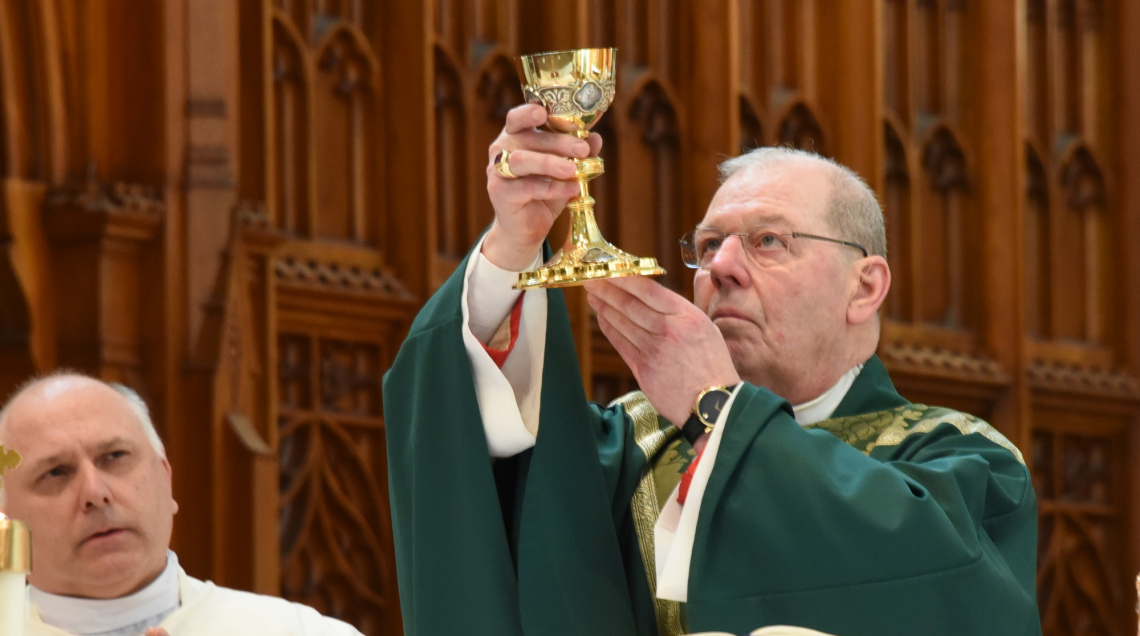From the Bishop - March 2020

The Pew Research Center, which provides information on social issues and public opinion shaping the United States, usually through surveys, published the results of a religion survey last summer. It concluded that almost seven out of 10 Catholics believe that during the Mass, the bread and wine used in Communion “are symbols of the body and blood of Jesus Christ.” In fact, it is much more than that. We believe that the change is real. The bread and wine become the body and blood of Jesus.
Surveys, of course, are interesting things. It is always important to note that the way the questions are posed can influence the answers. This survey has received a fair amount of criticism in this regard. At the same time, the results of the survey give us serious pause. Whatever the methodology used, it is clear that many Catholics do not understand the gift that is ours in the Most Holy Eucharist. There, we receive the body and blood of Christ. This is not only a key teaching of the Church; it is central to our Catholic life. The Eucharist, as the Second Vatican Council tells us, is “the source and summit of Christian life.”
As we approach the beginning of Lent, it might be good if we renew within ourselves an appreciation of the Eucharist as the privileged place where we meet Jesus Christ, where we experience the love of God He brings us, and where we ask Him to accompany us on our journey of life. After all, as we have been reminded many times, “Being Christian is not the result of an ethical choice or a lofty idea, but the encounter with an event, a person, which gives life a new horizon and a decisive direction.” (Pope Benedict: God is Love). That person is Jesus Christ. We encounter Him in the Eucharist where He gives himself to the Father for our sins and draws us into a relationship with Him.
Our Lenten reflection might begin with the account of the events in the life of the apostles and Jesus on the night before He died, the one we now call Holy Thursday from Matthew’s Gospel:
“While they were eating, Jesus took bread, said the blessing, broke it, and giving it to his disciples said, "Take and eat; this is my body." Then he took a cup, gave thanks, and gave it to them, saying, "Drink from it, all of you, for this is my blood of the covenant, which will be shed on behalf of many for the forgiveness of sins" (Mt 26:26-28; cf. Mk 14:22-24, Lk 22:17-20, 1 Cor 11:23-25).
When these words of Jesus are repeated in the celebration of the Eucharist by the priest celebrant, we Catholics profess our belief that the bread and wine do become the body and blood of Jesus through the power of the Holy Spirit. It is the ‘mystery of faith’ we proclaim: “When we eat this Bread and drink this Cup, we proclaim your Death, O Lord, until you come again.”
The Jesus who gives Himself for us in the Eucharist is the one who told us “I am the living bread that came down from heaven; whoever eats this bread will live forever; and the bread I will give is my flesh for the life of the world, for my flesh is true food, and my blood is true drink” (Jn 6: 51-55). Jesus Christ is truly present under the appearances of bread and wine, the glorified Christ who rose from the dead after dying for our sins. This is what we as Catholics mean when we speak of the “Real Presence” of Christ in the Eucharist. The Church teaches that Christ remains present under the appearances of bread and wine as long as the appearances of bread and wine remain (Catechism of the Catholic Church no. 1377).
This notion of the real presence of Christ in the Eucharist is not just a theological truth. It is, for us, the followers of Jesus, a way of life. When we receive holy Communion, it is Jesus we receive. And our prayer when we receive Him is that we be in communion with Him, that we become like Him. His presence with us gives us the direction for our lives. As St, Augustine told us, “We become what we receive.” In our prayer, we ask that we might be able to be like Christ, that we might be able to give of ourselves for others just as He did. Recall that the Eucharist is “the source” of Christian life. It is communion with Christ and with His body, the members of the Church, that guides our lives. As we reflect on the gift that the Eucharist is for us and appreciate more deeply the love of God we know there, we pray that we will also find ourselves more generous with those about us, more attentive to the needs of others, and more willing to listen to others. In sum, may Lent be a time of grace where we deepen our relationship with the Lord and strive to live as His followers.
A blessed Lent to you all!










